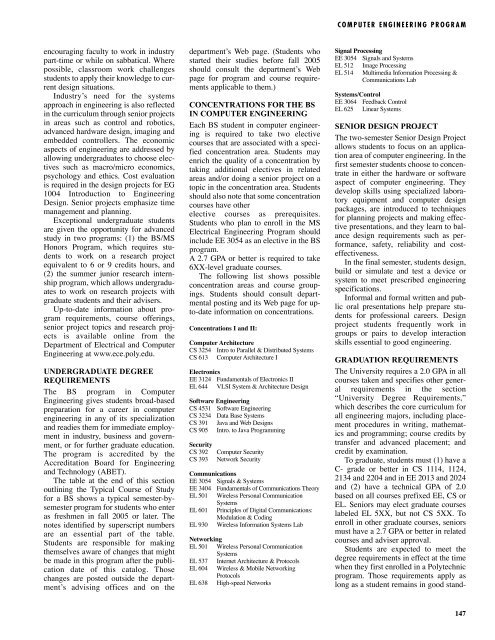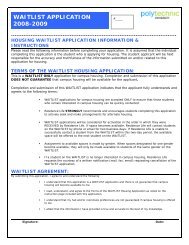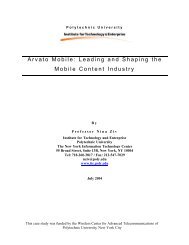POLYTECHNIC UNIVERSITY 2005-2007
POLYTECHNIC UNIVERSITY 2005-2007
POLYTECHNIC UNIVERSITY 2005-2007
Create successful ePaper yourself
Turn your PDF publications into a flip-book with our unique Google optimized e-Paper software.
COMPUTER ENGINEERING PROGRAM<br />
encouraging faculty to work in industry<br />
part-time or while on sabbatical. Where<br />
possible, classroom work challenges<br />
students to apply their knowledge to current<br />
design situations.<br />
Industry’s need for the systems<br />
approach in engineering is also reflected<br />
in the curriculum through senior projects<br />
in areas such as control and robotics,<br />
advanced hardware design, imaging and<br />
embedded controllers. The economic<br />
aspects of engineering are addressed by<br />
allowing undergraduates to choose electives<br />
such as macro/micro economics,<br />
psychology and ethics. Cost evaluation<br />
is required in the design projects for EG<br />
1004 Introduction to Engineering<br />
Design. Senior projects emphasize time<br />
management and planning.<br />
Exceptional undergraduate students<br />
are given the opportunity for advanced<br />
study in two programs: (1) the BS/MS<br />
Honors Program, which requires students<br />
to work on a research project<br />
equivalent to 6 or 9 credits hours, and<br />
(2) the summer junior research internship<br />
program, which allows undergraduates<br />
to work on research projects with<br />
graduate students and their advisers.<br />
Up-to-date information about program<br />
requirements, course offerings,<br />
senior project topics and research projects<br />
is available online from the<br />
Department of Electrical and Computer<br />
Engineering at www.ece.poly.edu.<br />
UNDERGRADUATE DEGREE<br />
REQUIREMENTS<br />
The BS program in Computer<br />
Engineering gives students broad-based<br />
preparation for a career in computer<br />
engineering in any of its specialization<br />
and readies them for immediate employment<br />
in industry, business and government,<br />
or for further graduate education.<br />
The program is accredited by the<br />
Accreditation Board for Engineering<br />
and Technology (ABET).<br />
The table at the end of this section<br />
outlining the Typical Course of Study<br />
for a BS shows a typical semester-bysemester<br />
program for students who enter<br />
as freshmen in fall <strong>2005</strong> or later. The<br />
notes identified by superscript numbers<br />
are an essential part of the table.<br />
Students are responsible for making<br />
themselves aware of changes that might<br />
be made in this program after the publication<br />
date of this catalog. Those<br />
changes are posted outside the department’s<br />
advising offices and on the<br />
department’s Web page. (Students who<br />
started their studies before fall <strong>2005</strong><br />
should consult the department’s Web<br />
page for program and course requirements<br />
applicable to them.)<br />
CONCENTRATIONS FOR THE BS<br />
IN COMPUTER ENGINEERING<br />
Each BS student in computer engineering<br />
is required to take two elective<br />
courses that are associated with a specified<br />
concentration area. Students may<br />
enrich the quality of a concentration by<br />
taking additional electives in related<br />
areas and/or doing a senior project on a<br />
topic in the concentration area. Students<br />
should also note that some concentration<br />
courses have other<br />
elective courses as prerequisites.<br />
Students who plan to enroll in the MS<br />
Electrical Engineering Program should<br />
include EE 3054 as an elective in the BS<br />
program.<br />
A 2.7 GPA or better is required to take<br />
6XX-level graduate courses.<br />
The following list shows possible<br />
concentration areas and course groupings.<br />
Students should consult departmental<br />
posting and its Web page for upto-date<br />
information on concentrations.<br />
Concentrations I and II:<br />
Computer Architecture<br />
CS 3254 Intro to Parallel & Distributed Systems<br />
CS 613 Computer Architecture I<br />
Electronics<br />
EE 3124 Fundamentals of Electronics II<br />
EL 644 VLSI System & Architecture Design<br />
Software Engineering<br />
CS 4531 Software Engineering<br />
CS 3234 Data Base Systems<br />
CS 391 Java and Web Designs<br />
CS 905 Intro. to Java Programming<br />
Security<br />
CS 392 Computer Security<br />
CS 393 Network Security<br />
Communications<br />
EE 3054 Signals & Systems<br />
EE 3404 Fundamentals of Communications Theory<br />
EL 501 Wireless Personal Communication<br />
Systems<br />
EL 601 Principles of Digital Communications:<br />
Modulation & Coding<br />
EL 930 Wireless Information Systems Lab<br />
Networking<br />
EL 501 Wireless Personal Communication<br />
Systems<br />
EL 537 Internet Architecture & Protocols<br />
EL 604 Wireless & Mobile Networking<br />
Protocols<br />
EL 638 High-speed Networks<br />
Signal Processing<br />
EE 3054 Signals and Systems<br />
EL 512 Image Processing<br />
EL 514 Multimedia Information Processing &<br />
Communications Lab<br />
Systems/Control<br />
EE 3064 Feedback Control<br />
EL 625 Linear Systems<br />
SENIOR DESIGN PROJECT<br />
The two-semester Senior Design Project<br />
allows students to focus on an application<br />
area of computer engineering. In the<br />
first semester students choose to concentrate<br />
in either the hardware or software<br />
aspect of computer engineering. They<br />
develop skills using specialized laboratory<br />
equipment and computer design<br />
packages, are introduced to techniques<br />
for planning projects and making effective<br />
presentations, and they learn to balance<br />
design requirements such as performance,<br />
safety, reliability and costeffectiveness.<br />
In the final semester, students design,<br />
build or simulate and test a device or<br />
system to meet prescribed engineering<br />
specifications.<br />
Informal and formal written and public<br />
oral presentations help prepare students<br />
for professional careers. Design<br />
project students frequently work in<br />
groups or pairs to develop interaction<br />
skills essential to good engineering.<br />
GRADUATION REQUIREMENTS<br />
The University requires a 2.0 GPA in all<br />
courses taken and specifies other general<br />
requirements in the section<br />
“University Degree Requirements,”<br />
which describes the core curriculum for<br />
all engineering majors, including placement<br />
procedures in writing, mathematics<br />
and programming; course credits by<br />
transfer and advanced placement; and<br />
credit by examination.<br />
To graduate, students must (1) have a<br />
C- grade or better in CS 1114, 1124,<br />
2134 and 2204 and in EE 2013 and 2024<br />
and (2) have a technical GPA of 2.0<br />
based on all courses prefixed EE, CS or<br />
EL. Seniors may elect graduate courses<br />
labeled EL 5XX, but not CS 5XX. To<br />
enroll in other graduate courses, seniors<br />
must have a 2.7 GPA or better in related<br />
courses and adviser approval.<br />
Students are expected to meet the<br />
degree requirements in effect at the time<br />
when they first enrolled in a Polytechnic<br />
program. Those requirements apply as<br />
long as a student remains in good stand-<br />
147




